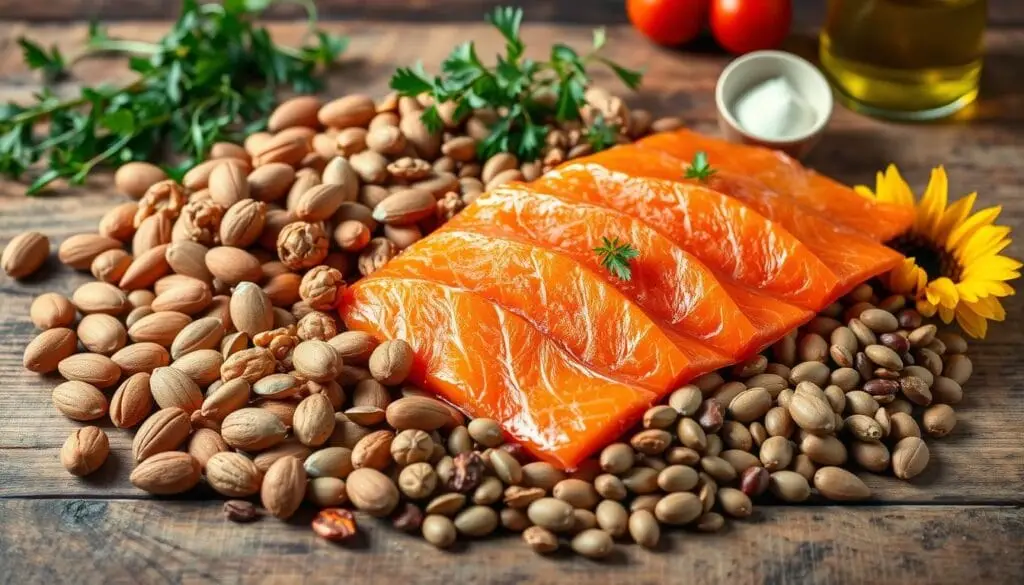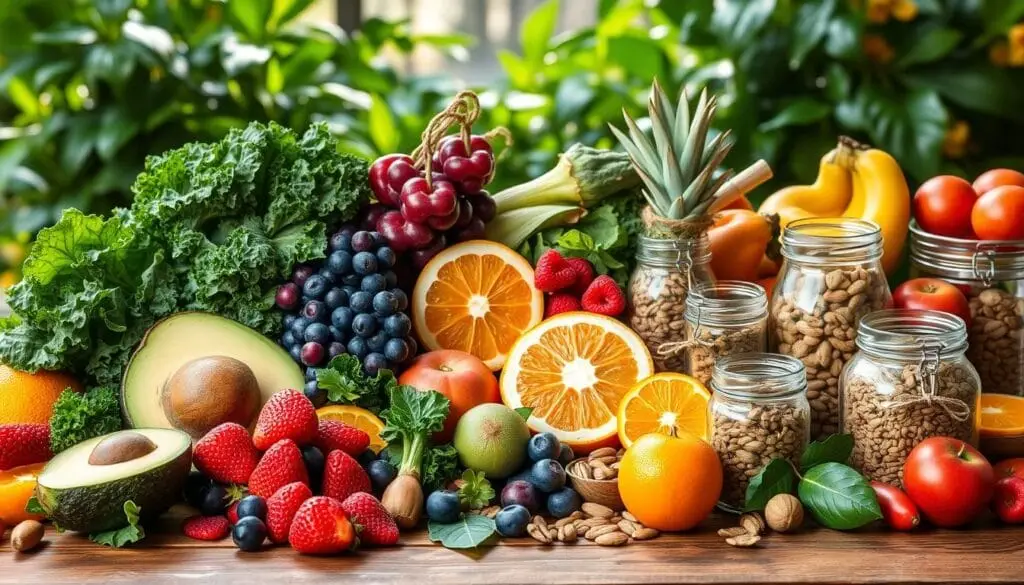Did you know sugary drinks like sodas and fruit juices are big sources of added sugar in the US? Drinking these can raise your risk of heart disease and type 2 diabetes, even if you’re not overweight. This shows how crucial it is to focus on good nutrition to keep your body healthy.
We’ll share important nutrition tips to guide you in choosing the right foods. You’ll learn how to avoid sugary drinks and eat foods rich in nutrients. We’ll also talk about staying hydrated and getting enough sleep. These tips are backed by science and can help you feel great and live well.
What Good Nutrition Means for Your Body
Good nutrition is more than just counting calories. It’s about giving your body the right whole foods full of nutrients. The idea that “calories in, calories out” is too simple. It doesn’t consider the quality of those calories.
Calories In vs. Calories Out
Nutrient-dense foods like fruits, veggies, whole grains, and lean proteins are better for you. They offer more health benefits than processed foods that are high in calories but low in nutrients. Choosing foods high in nutrient density helps your body get what it needs for health and energy.
The Importance of Nutrient-Dense Foods
Good nutrition can lower the risk of diseases like heart disease, diabetes, and some cancers. Eating lots of fruits and vegetables boosts your health. Whole grains and lean proteins help keep your diet balanced. Low-fat or fat-free dairy products are good for your bones because of their calcium and vitamin D.
“Proper nutrition is about fueling your body with the right types of whole foods that are packed with essential nutrients.”
By focusing on nutrient-dense foods and avoiding processed ones, you ensure your body gets the nutrients it needs. This can improve your energy, health, and lower the risk of chronic diseases.
Limit Sugary Drinks and Added Sugars
Sugary drinks like soda, fruit juice, and sweetened teas are full of added sugars. Drinking too much of these can lead to heart disease, type 2 diabetes, and other health issues. The CDC says 30% of Americans 2 and older eat and drink too much added sugar every day.
A 20-ounce soda, sweetened tea, or energy drink has more than 70 grams of added sugars. This is way over the daily limit for most people. The Dietary Guidelines suggest that kids under 2 should not have added sugar. For those 2 and older, it’s recommended to keep added sugars under 10% of daily calories.
To cut down on sugar intake, choose water, unsweetened teas, or black coffee over sugary drinks. The NYC Health Department says “Cutting out two regular sodas per day would reduce total calories by 2,100 in a week and help reduce sugar intake.”
- Sugary drinks provide the most added sugar in the typical U.S. diet among all food and beverage categories.
- NYC implemented a rule requiring chain restaurants with 15 or more locations to post an added sugars icon next to menu items with at least 50 grams of added sugars.
- The recommendation for people 2 and older is to limit added sugars to less than 10% of total daily calories.
By making simple swaps and limiting your consumption of sugar-sweetened beverages, you can take an important step towards supporting your long-term health and well-being.
Nutrition Tips

Eat Nuts, Seeds, and Fatty Fish
Nuts, seeds, and fatty fish are packed with good stuff. They have healthy fats, protein, fiber, and lots of vitamins and minerals. Eating them can help you stay healthy and manage your weight.
Fatty fish like salmon and mackerel are full of omega-3s. These fats are great for your heart and can help with diseases like Alzheimer’s. Try to eat these foods often.
Avoid Ultra-Processed Foods
But, cut down on ultra-processed foods. They’re full of artificial stuff and offer little nutrition. Eating too much of them can lead to weight gain and health problems.
Stick to fresh, whole foods instead. They’re better for your health and well-being.
By following these tips, you can give your body what it needs to stay healthy.
| Nutrient-Dense Foods | Benefits |
|---|---|
| Nuts and Seeds | Support weight management, reduce disease risk, improve overall health |
| Fatty Fish | Provide omega-3 fatty acids, which can reduce cardiovascular disease risk and manage degenerative conditions |
| Ultra-Processed Foods | Contain artificial additives, refined oils, and added sugars, contributing to weight gain and chronic disease risk |
Embrace Coffee and Hydration
Some people think coffee is bad for you, but it’s actually good in small amounts. It’s full of antioxidants and might help prevent diseases like type 2 diabetes and Parkinson’s. But, too much caffeine can be harmful.
Drinking water is also very important for your health. A UCLA study found that many elderly people don’t drink enough water. Men over 51 should drink about 13 cups a day, and women should aim for 9 cups, says the National Academy of Medicine.
To figure out how much water you need, weigh yourself and drink a third of that in ounces. Older people sweat more because their bodies don’t cool down as well, a study found.
Eating foods with lots of water, like cucumbers and watermelon, can help you stay hydrated. Try to drink at least eight glasses of water a day. If you’re active, drink more.
“Drinking water is essential for maintaining optimal health and well-being. It plays a vital role in various bodily functions, from regulating body temperature to supporting digestion and cognitive function.”
Enjoying coffee in small amounts and drinking plenty of water can keep your body and mind healthy.
Get Enough Sleep and Exercise

Getting enough sleep and exercising regularly are key for your health. Poor sleep can mess with your hormones and raise your risk of chronic diseases. It can also lead to weight gain. On the other hand, exercise boosts your heart health, strengthens muscles and bones, and lowers the risk of obesity and type 2 diabetes.
The Benefits of Physical Activity
Regular exercise helps keep your weight healthy and lowers disease risk. Studies show that diet and exercise together are better than diet alone. But, remember to eat well before intense workouts to avoid nausea.
- Improved cardiovascular health
- Stronger muscles and bones
- Reduced risk of obesity and type 2 diabetes
- Better cognitive function and mood
While exercise is great, don’t forget about sleep. Adults need at least seven hours of sleep each night. Yet, almost one-third of Americans get less. Lack of sleep can hurt your focus, brain function, and even make your waist bigger and increase obesity risk.
“Sufficient sleep is crucial for muscle tissue recovery between workouts. Insufficient sleep can lead to being less physically active during the day and reduced muscle strength during workouts.”
To stay healthy, make sleep a top priority. Cognitive behavioral therapy and sometimes medications can help those with sleep disorders like insomnia or sleep apnea. This can improve their sleep quality and length.
By focusing on both sleep and exercise, you can enjoy many benefits for your body and mind. This approach also lowers your risk of chronic diseases. Remember, a balanced lifestyle is essential for a healthier, more vibrant life.
Prioritize Fruits, Vegetables, and Protein

Eating a variety of fruits, vegetables, and protein-rich foods is key. These foods give your body the nutrients it needs to work well. They are full of fiber, vitamins, minerals, and plant compounds that help your immune system, gut health, and prevent chronic diseases.
The American Heart Association says to eat 4½ cups of fruits and 4½ cups of vegetables daily. All kinds of produce, like canned, fresh, and frozen, count towards this goal. Eating different colors of fruits and vegetables gives you a range of nutrients like fiber, potassium, folate, and vitamins A and C.
Adding protein-rich foods like lean meats, poultry, eggs, legumes, and nuts is also important. Foods like grilled chicken, roasted turkey, lentils, and almonds are great for meals and snacks. They help with muscle health, metabolism, and overall health.
| Nutrient-Dense Food | Key Nutrients | Health Benefits |
|---|---|---|
| Avocado | Monounsaturated fats, fiber, vitamins, and minerals | Supports heart health and reduces disease risk |
| Watermelon | High in water content, antioxidants, and vitamins | Aids in weight management and boosts immune function |
| Microgreens | Higher levels of antioxidants and essential nutrients | Supports overall health and reduces chronic disease risk |
By focusing on a diet full of fruits, vegetables, and protein, you feed your body well. You get the vitamins, minerals, fiber, and antioxidants it needs to stay healthy.
Moderate Unhealthy Habits

Unhealthy behaviors like smoking, drug use, and excessive alcohol consumption harm your health. They increase the risk of chronic diseases such as heart disease, cancer, and liver disease. Cutting down or stopping these habits can greatly improve your health.
Limit Smoking, Drugs, and Alcohol
Smoking causes lung cancer, heart disease, and stroke. Quitting can greatly improve your health and lower your risk of these diseases. Drug use can harm your physical and mental health, leading to addiction and overdose. Drinking too much alcohol can cause liver disease, cancer, and other serious health problems.
- Try to limit or stop these unhealthy habits for your health and well-being.
- Get help from healthcare professionals, support groups, or programs to quit smoking or reduce drug or alcohol use.
- Remember, your health is the most important thing. Making healthy lifestyle changes can greatly improve your life.
“Quitting smoking is one of the best things you can do for your health. It’s never too late to start reaping the benefits.”
By cutting down or stopping these unhealthy habits, you can lower your risk of chronic diseases. You can live a healthier, more vibrant life.
Use Healthy Fats Like Olive Oil

Incorporating healthy fats like olive oil into your diet can greatly benefit your nutrition. Olive oil is packed with monounsaturated fatty acids and antioxidants. These make it a great addition to a balanced diet.
Monounsaturated fats in olive oil can lower bad cholesterol and raise good cholesterol. This helps reduce heart disease risk. The antioxidants in olive oil, like polyphenols, protect against oxidative stress and inflammation.
Switching to olive oil from unhealthy fats is a simple way to boost your meal’s nutritional value. Use it to sauté veggies, drizzle over salads, or in baking. Olive oil is a versatile and healthy choice.
| Fat Source | Fat Content (per 100g) | Saturated Fat | Monounsaturated Fat | Polyunsaturated Fat |
|---|---|---|---|---|
| Olive Oil | 100g | 14g | 73g | 11g |
| Avocado | 100g | 14.7g | 71g | 13.5g |
| Walnuts | 100g | 6.1g | 8.9g | 47.2g |
| Salmon | 100g | 2.3g | 6.5g | 4.5g |
The table shows the nutritional profiles of healthy fats. It highlights olive oil and avocado’s high monounsaturated fat content. These fats are key for heart health and offer antioxidant benefits.
Adding healthy fats like olive oil to your diet is a simple way to improve nutrition. Making informed food choices supports your long-term health. This fuels your body and life with essential nutrients.
Conclusion
By following these evidence-based nutrition tips, you can give your body the nutrients it needs to thrive. Limit sugary drinks and choose whole foods instead. Also, make sure to get enough sleep and exercise.
Good nutrition is more than just counting calories. It’s about feeding your body the right nutrients for energy and health. This approach helps you stay vital for life.
Eating a balanced diet with fruits, veggies, whole grains, lean proteins, and healthy fats is key. Add regular exercise to prevent chronic diseases and support your health. Making smart food choices and getting advice from health experts can help you develop lasting eating habits.
For a vibrant, energetic life, focus on a holistic approach to nutrition and wellness. Take these tips seriously and start your journey to better health. Your body and mind will be grateful for your dedication.
Source Links
- 27 Health and Nutrition Tips That Are Actually Evidence-Based – https://www.healthline.com/nutrition/27-health-and-nutrition-tips
- 8 tips for healthy eating – https://www.nhs.uk/live-well/eat-well/how-to-eat-a-balanced-diet/eight-tips-for-healthy-eating/
- Nutrition for Your Life: Eat to Fuel, not Fill | Western Wisconsin Health – https://www.wwhealth.org/nutrition-for-your-life-eat-to-fuel-not-fill/
- The Importance of Good Nutrition – https://www.tuftsmedicarepreferred.org/healthy-living/importance-good-nutrition
- Healthy Eating Tips – https://www.cdc.gov/nccdphp/dnpao/features/healthy-eating-tips/index.html
- Nutrition – Harvard Health – https://www.health.harvard.edu/topics/nutrition
- Nutrition: Added Sugars – NYC Health – https://www.nyc.gov/site/doh/health/health-topics/added-sugars.page
- Rethink Your Drink – https://www.cdc.gov/healthy-weight-growth/rethink-your-drink/index.html
- 29 nutrition tips to improve health for everyone – https://www.medicalnewstoday.com/articles/nutrition-tips
- 30 Tips to Help Your Family Eat Better – https://www.heart.org/en/healthy-living/healthy-eating/eat-smart/nutrition-basics/daily-tips-to-help-your-family-eat-better
- 10 Tips for Better Nutrition – NYC Health + Hospitals – https://www.nychealthandhospitals.org/healthtips/10-tips-for-better-nutrition/
- The Importance of Hydration for Older Adults – https://www.ncoa.org/article/how-to-stay-hydrated-for-better-health/
- 6 Nutrition Tips for a Healthier New Year – https://cals.ncsu.edu/news/revitalize-your-plate-nutrition-tips-for-a-healthier-new-year/
- Embrace Intuitive Eating for Optimal Health – Mind & Body Complete – https://mindbodycomplete.com/embrace-intuitive-eating-for-optimal-health/
- The Connection Between Diet, Exercise, and Sleep – https://www.sleepfoundation.org/physical-health/diet-exercise-sleep
- Good Sleep for Good Health – https://newsinhealth.nih.gov/2021/04/good-sleep-good-health
- Healthy Eating 101: Nutrients, Macros, Tips, and More – https://www.healthline.com/nutrition/how-to-eat-healthy-guide
- Tips For Eating Healthy | AgLab – https://aglab.ars.usda.gov/the-nutrition-corner/tips-for-eating-healthy
- How to Eat More Fruit and Vegetables – https://www.heart.org/en/healthy-living/healthy-eating/add-color/how-to-eat-more-fruits-and-vegetables
- 25 Simple Tips to Make Your Diet Healthier – https://www.healthline.com/nutrition/healthy-eating-tips
- 10 Unhealthy Habits You Need to Break Now – https://www.eatingwell.com/article/275602/10-unhealthy-habits-you-need-to-break-now/
- Choosing Healthy Fats – HelpGuide.org – https://www.helpguide.org/wellness/nutrition/choosing-healthy-fats
- Healthy fats: 12 high fat foods to eat – https://www.medicalnewstoday.com/articles/322295
- Nutrition: Tips for Improving Your Health – familydoctor.org – https://familydoctor.org/nutrition-tips-for-improving-your-health/
- Keep Active & Eat Healthy to Improve Well-being & Feel Great – NIDDK – https://www.niddk.nih.gov/health-information/weight-management/keep-active-eat-healthy-feel-great
- The Best Diet: Quality Counts – https://nutritionsource.hsph.harvard.edu/healthy-weight/best-diet-quality-counts/

